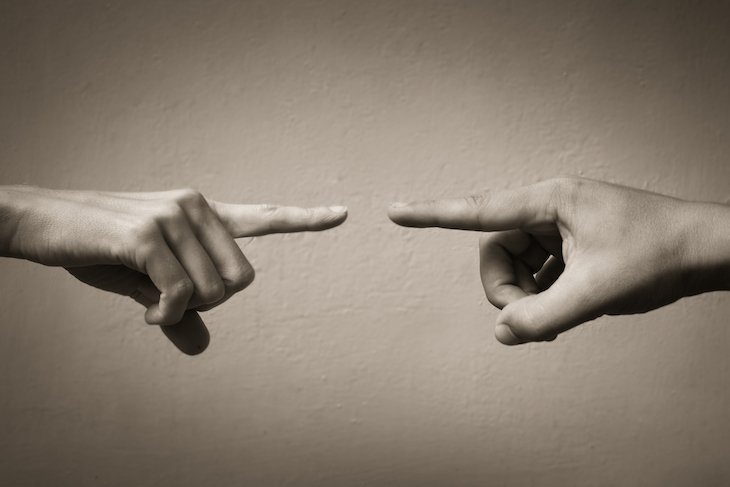After an essay in this month’s Prospect about literature and freedom of speech, it seems I was cited on Twitter as a ‘racist provocateur’. Now, I rather fancy being a ‘provocateur’. But as for the adjective.
Someone can call you ‘stupid’, and that’s just one person’s opinion. It doesn’t seem true because a single childish naysayer has impugned your intellectual prowess. Yet hitherto, the tag ‘racist’ has tended to stick. And it’s self-verifying. Why ever would anyone call you a racist if you weren’t one? In our current climate of sensitivity about race (and everything else), finger-pointers wield enormous power.
A sole review of my last novel — amid perhaps a hundred — characterised The Mandibles (hence also its author) as ‘racist’. The evidence: my Latino US president of 2029 speaks ‘with a lisp’, a description of the reviewer’s invention. The review also took a snapshot out of context. A secondary character — who married into a white family and happens to be black, but is more pertinently suffering from advanced early-onset dementia — is part of a midnight trek to a refugee encampment. To prevent the confused, often violent woman from wandering off in a dangerous city, the family leads her by a leash. (How else would they control her?) By inference, Shriver wants to bring back slavery. Great.
One malefactor resorting to the nuclear option can set off a chain reaction. When I made the mistake of analysing the weak support for this allegation in a widely publicised speech, the R-word bounced merrily around social media. Aspersions were cast on my moral integrity on the webpage of none other than the New Yorker, where a contributing writer admitted that — like so many fatwa brandishers who’ve never come within a mile of The Satanic Verses — she hadn’t read my book. Still, that ostensibly racist scenario ‘didn’t sound promising’. The vast majority of these traducers, having read neither the offending novel nor even the offended review, were three degrees of separation from the truth.
Again confronted with the indictment in an interview at a festival in Bali in 2016, I discovered what it’s like to try to distance yourself from a label that clings to your fingers like pinesap. I live in a mixed neighbourhood! I’m well travelled! I include other races in my fiction to reflect the diversity of the real world! My father was a civil rights activist and marched in Selma with Martin Luther King! Uh-huh. Bury me in Bali, where apparently I’ve dug my own grave.
Not for nothing is describing someone as ‘sounding defensive’ a charge of strategic malfeasance. It’s a wonder that anyone ever establishes innocence, given how guilty we all appear when we claim we didn’t do something. Why, to my own eyes, that justification of The Mandibles in my third paragraph looks fishy.
For you cannot prove a negative. Try this exercise: prove you’re not a racist. Interestingly, the more you go on about your laudable colour-blindness, the dodgier you’ll sound. Thus, forcing people to repudiate this epithet is inviting them to hang themselves.
In our age of denunciation, calling others racists offers tempting cover from having the same rhetorical cudgel land on the detractor, just as writhing in pain absolves accusers in The Crucible of being witches. That immunity is precious, since a racist has become the very worst thing that anyone can be.
Hey, we’re all racists, to a greater or lesser degree. That is, we’ve all developed preconceptions about one another. We vary in our success in resisting stereotypes from person to person, and from day to day. This is not only a problem for white people. Post-Charlottesville, the hyperbolic proxy ‘white supremacist’ has abruptly gained such currency because it conveniently applies only to us crackers. Yet the number of card-carrying white supremacists in the US would not fill a football stadium. The ramping up of opprobrium suggests that plain old ‘racist’ is losing its punch. As leftists compete with each other over who’s more righteous, many folks tarred as prejudiced these days are the comparatively open-minded. With a black husband and two biracial kids, Ellen Pompeo, the star of the TV show Grey’s Anatomy, was attacked in late 2016 as ‘racist’ for using dark-skinned emojis. Broadly onside, other targets may not have passed the fastidious progressive litmus test on every issue. Do real racists mind being called racists? True white supremacists are proud of being bigots. Like ‘fascist’, suffering from similar inflation, might we save this slag for those who most deserve it?
The term has gone woolly. Racism now carries with it the stink of bias against groups unrelated to race, like the disabled, gays and Muslims. In Britain, white Leave voters have been repeatedly smeared as ‘racist’, when the issue of EU freedom of movement largely involves an influx of other white people. The slur neatly casts Remain voters as pure of heart.
Often an ad hominem attack substituting for proper argument, ‘racist’ has become a cheap shot — a crafty but below-the-belt putdown that frequently reduces to ‘I disagree with you’ or ‘I don’t like your face’. Accordingly, the indiscriminate lynch-mob pejorative is beginning to assume all the unthinking prejudice of the N-word.
The first time I gathered that I was being insulted in this manner, I was incensed. Thereafter, similar attacks induced a deep breath and long-suffering resignation. But the latest ‘racist provocateur’ tag was water off a duck’s back. I shrugged. The dig didn’t even deserve an eye roll. When fired willy-nilly at anyone who steps off the straight and narrow of identity politics orthodoxy, a high-calibre rhetorical weapon simply ceases to sting, and the polemical M16 shapeshifts into a Super Soaker.
We’re well on our way to the label becoming a perverse badge of pride; if you’re outside the far-left faithful, your first charge of racism constitutes a losing of your political cherry, inoculating against any further sense of injury. This commonplace code for ‘not one of us’ is morphing into a meaningless playground taunt, just as forgettable as ‘stupid’.


















